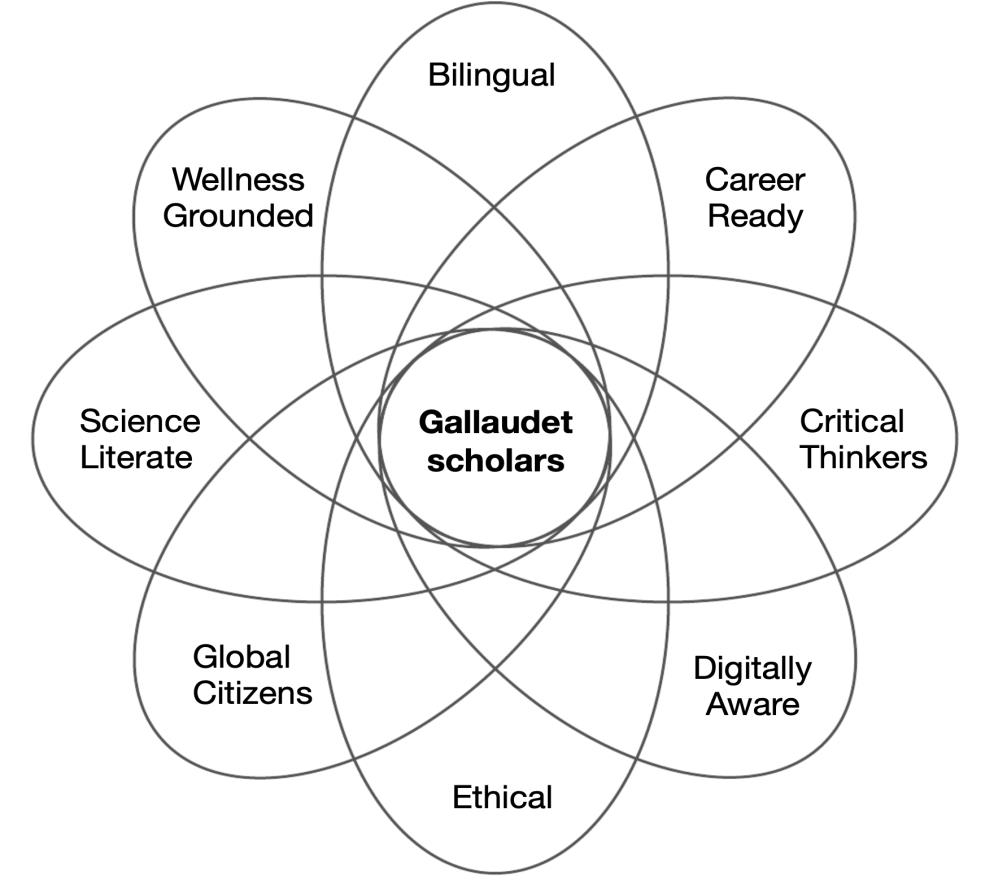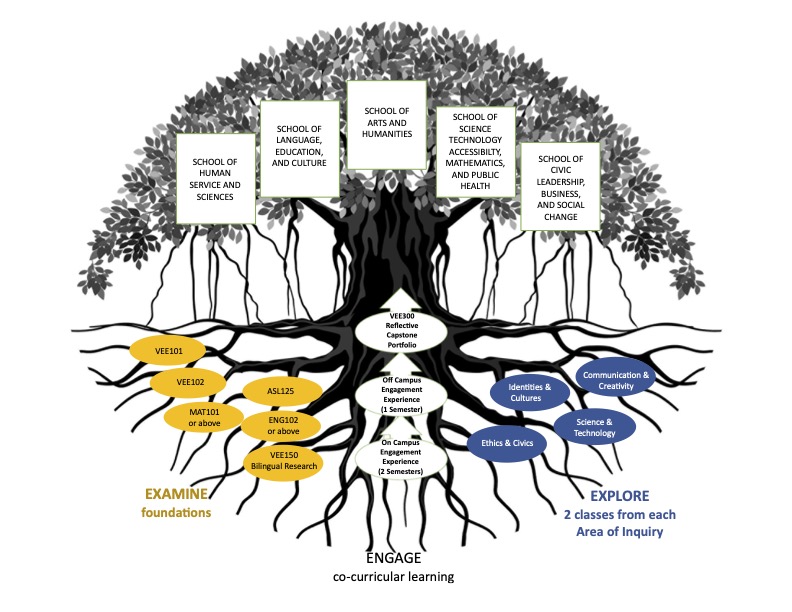General Education
Gallaudet University welcomes students into a unique learning environment, designed for deaf scholars and those who wish to engage deeply with deaf communities. Within this context, Gallaudet's Core curriculum provides learning opportunities that support the ability to be healthy, productive agents of positive change in all of our communities. We do so by deeply respecting our Deaf and other interacting identities, and grounding into them as we explore ways to engage more deeply with each other and the world.
Three components
- Examine: welcoming ourselves and each other to this journey of deaf academic co-creation; setting the foundation for continuously striving to better understand ourselves, in relation to each other, and the skills we all continually strive to improve
- Exploration: challenging ourselves to consider myriad possible ways of thinking, learning, interacting, innovating, and creating that lead toward positive advancement of deaf and other communities
- Engagement: practicing deep and positive interaction with each other and honing our skills for long-term engagement with our communities throughout our lives
The Core curriculum begins and ends with VEE*.
Our two semesters of first-year seminar (VEE 101 and VEE 102) welcome students into Gallaudet’s unique educational environment with deep dives into Deafhood, our bilingual identities as ASL and English users, and multi-cultural and multi-identity exploration, all grounded in personal wellness and self-discovery, which lead toward exploration of the academic possibilities Gallaudet has to offer while opening up thinking about myriad career opportunities beyond.
VEE 300 caps off each student’s Core experience with deep self-reflection on how they have grown and will continue to develop as Gallaudet scholars:
wellness-grounded, proudly bilingual, career-ready critical thinkers, who are digitally aware, ethical, scientifically literate global citizens

Core Requirements
Requires 43 credits (some credits may also count toward the student’s major or minor)
Three components of the Core curriculum:
- Examine (18 credits):
- Seminars: VEE 101 & VEE 102 (6 credits)
- ASL course: ASL 125 (3 credits)
- English course: ENG 102 or above (3 credits)
- Bilingual course: VEE 150 (3 credits)
- Math course: MAT 101 or above (3 credits)
- Explore (24 credits):
- Purpose: allow students the freedom to determine and follow their own interests while gaining the skills needed to explore big questions, develop foundational competence in discipline-specific methodologies and create new knowledge or novel solutions
- CORE: EXPLORE options
- 4 Areas of Inquiry
- Creativity & Communication
- Identities & Cultures
- Ethics & Civics
- Science & Technology
- Two courses (6 credits) required from each Area
- These may also count toward the student’s major or minor
- Engage (participation milestones plus 1 credit):
- Purpose: To foster a sense of belonging, develop relationships, build an ethic of civic responsibility and service, and gain practical experience
- At least two semesters of active participation on campus
- At least one semester of active participation off campus
- A final culmination one-credit online course
- VEE 300
- Completion of both on- and off-campus engagement as prerequisites
- Focused on developing a reflective portfolio, integrating learning from throughout the EXAMINE, EXPLORE, and ENGAGE components of the Core curriculum
- Connecting Core learning to the student’s major and future plans
- Using the Core SLOs as the touchstone

*VEE is the label for an ASL sign that doesn’t have a direct English translation. Its meaning incorporates the concepts of “notice, be fascinated, find interesting, analyze, observe, and watch”. When we use VEE as the name for our Core curriculum courses, we are celebrating our bilingualism and encouraging our students to be intellectually curious in both ASL and English and whatever languages they bring with them.
Program Outcomes
Wellness:Recognize how my choices can transform my health, well-being, and ability to thrive; seek support and utilize resources for personal growth; and work collaboratively to promote wellness on campus and within myself.
Bilingualism:Use American Sign Language (ASL) and written English to communicate effectively with diverse audiences for a variety of purposes.
Career Readiness:Develop career decision-making skills and competencies by engaging in theoretical and experiential learning.
Critical Thinking:Think critically and innovatively, and express myself creatively, making connections within and across disciplines.
Digital Awareness:Employ data and technology in effective, competent, fair, accountable, transparent, and responsible (ethical) ways.
Ethics:Formulate reasoned decisions about ethical issues that lead to wise action.
Science Literacy:Evaluate evidence derived from systematic analysis of quantitative and qualitative data to address issues that pertain to the experiences of individuals in societies.
Global Citizenship:Articulate knowledge of intersectional identities within a global society and demonstrate intercultural knowledge, cultural competence, and skills in constructive civic discourse on the local, national, and global levels.